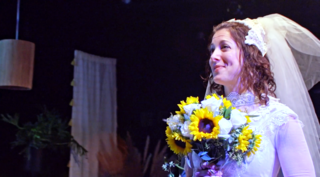Relationships
One Woman's Search for Intimacy and Meaning
On rediscovering our own self-worth.
Posted August 16, 2021 Reviewed by Devon Frye
The psychology of women is an important area of psychology that explores issues that women face throughout their lives with an eye toward how to improve the conditions, positions, and well-being of women in society in terms of economics, politics, and social life. As a theoretical and practical approach, the psychology of women has at its core a desire to consider women's experiences with intimacy, sexuality, desire, and relationships. A psychology of women isn't necessarily scholarly and found in books only. It can be, and often is, demonstrated through other crucial mediums like the visual and performing arts.
Feminist art pushes the boundaries of thinking and feeling and inhabiting the world. Amidst all that feels heartbreaking and heart-opening in this current cultural moment, I’m reminded that art is what makes us and what saves us. Going to a show is like a tune-up, helping the creative gears move more freely, inspiring me to get grounded back into my own creative process. More than inspiring, it’s insisting—an urgent reminder to make time and space for creativity and art, no matter what. This week I had the opportunity to watch a show that embodies all of this.
Actor Melissa Center wrote and stars in Marrying Jake Gyllenhaal, a one-woman show in which she sings, dances, embodies a complex constellation of characters, and reveals the extent to which girls and women are socialized and pressured into being in and maintaining relationships at all costs to themselves; Center dismantles this self-sacrificial ideology and with her, we begin to rejoice in how to cultivate a relationship with ourselves.

As Center belts out songs, dances playfully and confidently, and questions personal and cultural choices around sex and relationships, we hear whispers of Gloria Steinem’s famous line: “Some of us are becoming the men we wanted to marry.” In Marrying Jake Gyllenhaal, we witness Center’s work standing on the shoulders of feminist giants. The real gift is how she uses them as a springboard from which to leap into crafting something edgy, quirky, and current.
When you watch Center, you forget that she has been on shows like "Grey’s Anatomy" that might otherwise render her a remote actor with a reality much different from our own. As she moves around in jeans and a T-shirt and plops down on the loveseat or floor, she’s more like a girlfriend with whom we want to hang out and talk all night. Center possesses immediacy and depth. She sparkles. She’s also funny as hell—particularly when discussing Judaism, men, social media, dating apps, and her mother.
Center’s show is like a memoir unfolding on stage where the particulars of her life are laid bare and the universal themes reverberate. Intensely relatable, Center exposes mother-daughter relationships, gender, sexuality, harassment and trauma, love and longing, and trust in ourselves and our deepest instincts and desires.
One intense part of the show is when we learn the extent to which a past boyfriend of Center’s harasses her after she ended the relationship, which is then further exacerbated by police who objectify and sexualize Center. The fact that all this occurs in moments juxtaposed with Center’s intense expressions of desire, pleasure, and sexuality is riveting and powerful. As viewers, we’re forced to reconcile the multidimensionality of her experiences and, in turn, our own.
Though we don’t meet her because it’s a one-woman show, Center’s mother figures prominently. She’s loving and meddling; and though the meddling forms the play’s raison d’etre, the loving prevails which helps the show win. Intimately intertwined in her daughter’s life, Center’s mother inserts herself at times that alternate between heartwarming and nagging. In this way, she feels downright familiar.
“I hope people see that something is wrong with the fairytale narratives we’ve been fed from birth, that men don’t complete women,” Center told me. “That ultimately the most important relationship is the one you have with yourself.”
As a professor, I can see using this in classes to help students explore issues of identity inside of relationships, both familial and romantic. Forty-year-old Center admitted to me that she assumed the audience would be women closer to her age.
Surprised, Center said: “Now that you mention it, I think watching this play is extremely valuable to younger women and men… It’s okay to take whatever time you need to explore who you are and what you truly want. I think it encourages young people to not give up on themselves and to pay attention to red flags—they are there for a reason and help you understand where and when to set boundaries. To my younger self [I’d say], nothing about you is wrong. Love every single part.”
Particularly poignant are the scenes in which reminders of the pandemic are embedded—like when a drink is given to Center by a gloved hand or when we see the masked musicians. We acutely feel what Center means when she sings, “Searching for connection to alleviate my fears.” The entire show, especially the moments that spotlight the pandemic, illuminates the ways in which we simultaneously feel connected and disconnected—in relationships and within ourselves. It’s in these moments that you feel Center’s gutsiness and her longing for art-making, community-making, and love-making in the myriad forms that can take. And you metabolize just how much art makes love and how both make community.
In a day and age in which the fetishization with self-care isn’t always so authentic, Marrying Jake Gyllenhaal is its own expression of self-care via the lens of self-worth in which Center declares to herself: “You are made sacred to me.”
Center exudes love. The play is about making love and making art, however and whenever, in spite of it all and because of it all, with and for others, and ultimately with and for ourselves. It certainly seems we could use more of that in our world.
You can watch Marrying Jake Gyllenhaal online via the Edinburgh Fringe.
Note: A different version of this article was published in Ms. Magazine on August 12, 2021.




